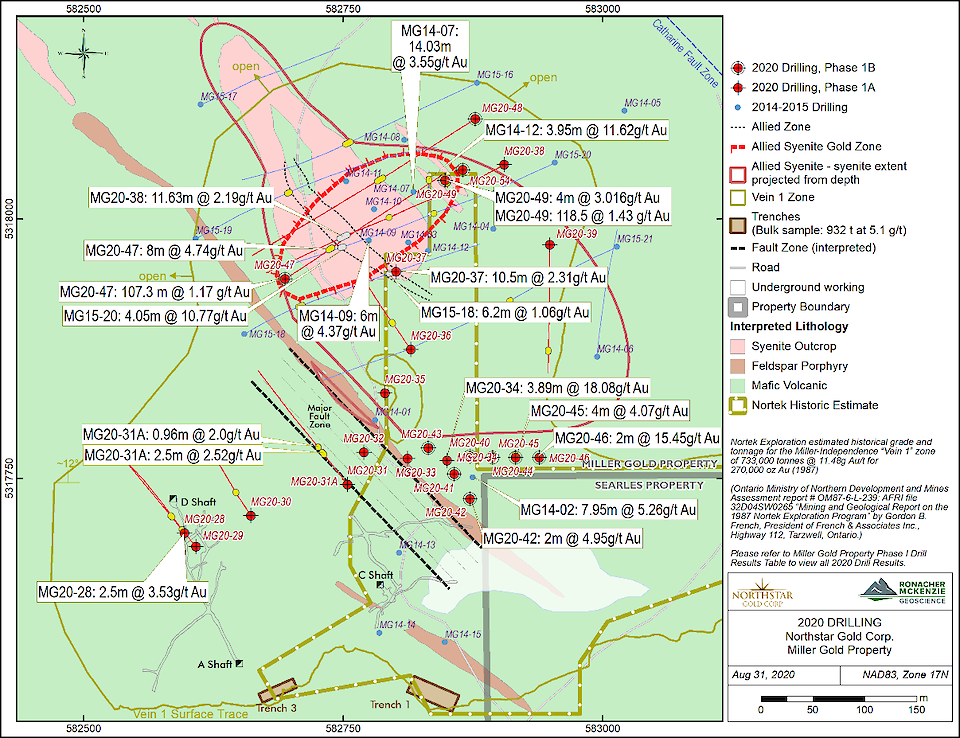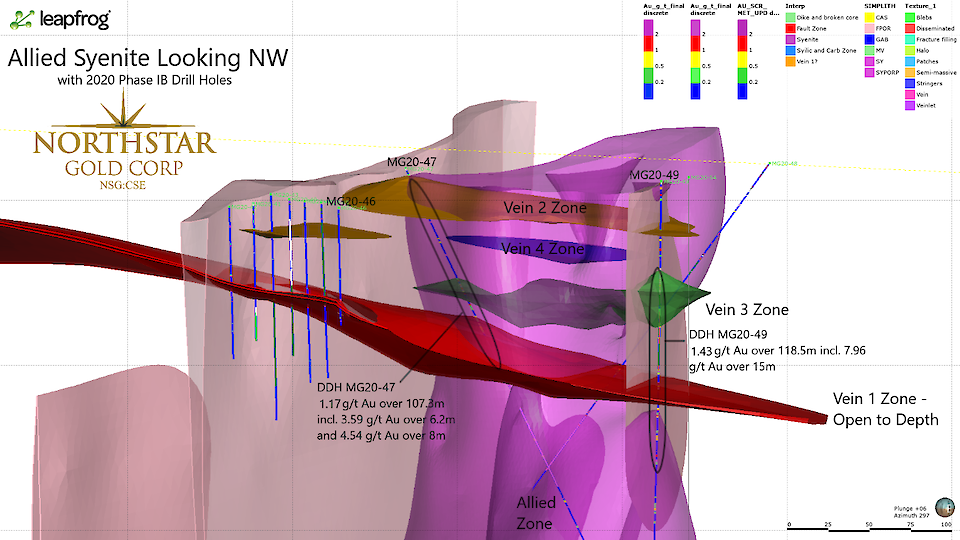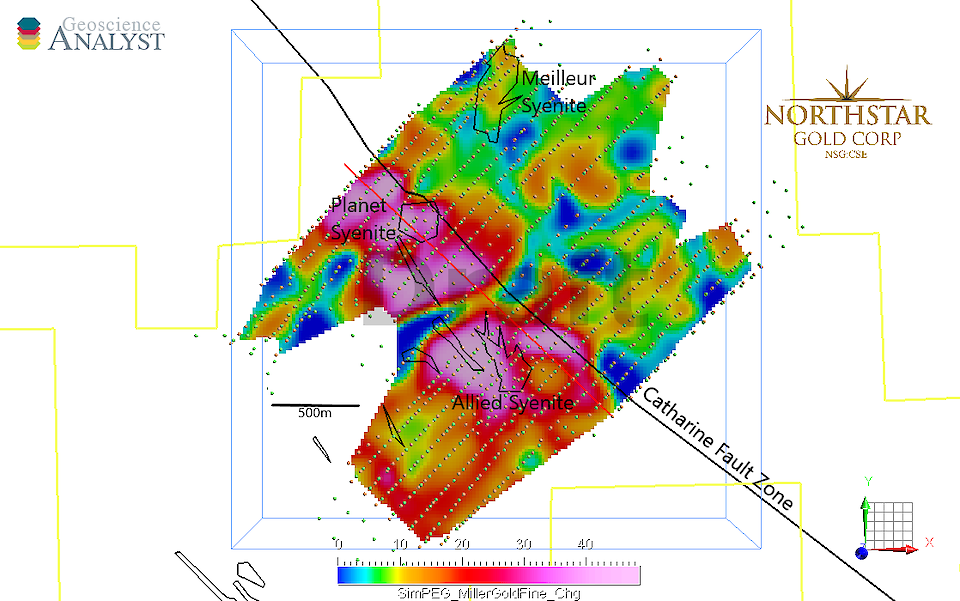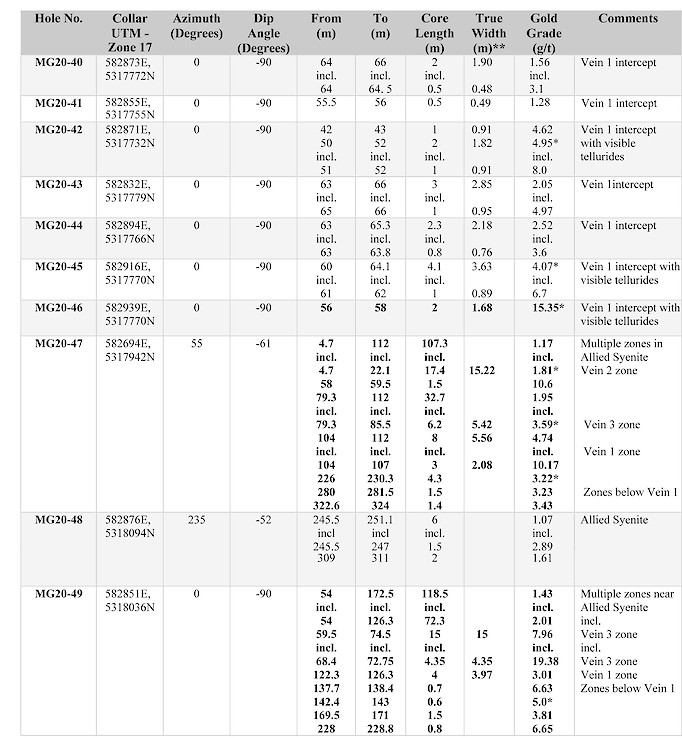Vancouver, B.C., September 2, 2020. Northstar Gold Corp. (CSE: NSG) (“Northstar” or the “Company”), reports Vein 1 and Allied Syenite drill results from the recently completed Phase I drill program on the Company’s 100%-owned Miller Gold Property, situated 18 kilometres southeast of the town of Kirkland Lake and Kirkland Lake Gold’s Macassa gold mine. Planet Syenite drill results are expected to be available later this month.
The primary objective of the Phase I drill program was to confirm and expand known near surface, Kirkland-style high grade gold/telluride mineralization and portions of a historic estimate within the Vein 1 Zone. The Phase I program not only succeeded in expanding the near surface, high-grade gold mineralized zone but it also discovered several additional near surface gold zones (Veins 2, 3 and 4 in the hanging wall of Vein 1, now collectively referred to as the Allied Syenite Gold Zone), highlighting the potential for the delineation of 43-101 compliant near surface bulk tonnage gold mineralization.
Phase I Drill Program
Northstar resumed Phase I drilling on the Miller Gold Property on June 16th, 2020, after a brief suspension of activities on April 4th, 2020, due to COVID-19 complications, and drilled 15 holes in 2,812 metres to follow-up previously reported Phase IA drill results (2,211 metres in 13 holes) on Vein 1 (18 g/t Au over 3.9m, including 100.0 g/t Au over 0.6m), the new Allied Zone (2.1 g/t Au over 11.6m), and further drill test the Allied Syenite and Planet Syenite near-surface bulk tonnage gold targets. Phase IB drilling was completed on August 4th, 2020, and includes drill holes MG20-40 through MG20-54. Previously reported Phase IA drilling, which ended on April 4th, 2020, included drill holes MG-20-28 through MG20-39.
All drill core has been logged with samples assayed for gold by AGAT Laboratories in Mississauga, Ontario. Metallic screening was performed on 27 samples associated with core intervals hosting coarse visible gold or gold tellurides. Assay results are pending for 4 drill holes on the Planet Syenite (drill holes MG20-50-53) and 1 drill hole (MG20-54) on the Allied Syenite.
Phase IB drill results are highlighted by:
- Hole MG20-49 intersected 8.0 g/t Au over 15m, including 19.4 g/t Au over 4.4m,within a larger zone of 1.4 g/t Au over 118.5m between 54m and 172.5m; this intercept highlights the grade potential of the mafic volcanics adjacent to the Allied Syenite contact and demonstrates that bulk tonnage potential extends beyond the boundary of the syenite intrusion.
- Hole MG20-47 intersected 4.6 g/t Au over 8.0m including 10.2 g/t Au over 3.0m within a larger zone of 1.2 g/t Au over 107.3m between 4.7m and 112m along the western flank of the Allied Syenite; this first hole in the western half of the syenite indicates potential for near surface bulk tonnage 43-101 compliant resources in this area.
- Hole MG20-45 intersected 4.1 g/t Au over 4.1m and MG20-46 intersected 15.5 g/t Au over 2.0m in the Vein 1 Zone south of the Allied Syenite; this confirms the high-grade nature of Vein 1 Zone, which remains open in all directions.
- A complete listing of Phase IB drill results is provided in Table 1.
“Northstar is very pleased with Phase I drill results”, states Brian Fowler, President and CEO of the Company. “The Miller Gold Property has the signature of a large and robust intrusion-centred alkalic gold system complete with the important elements of a Kirkland-style gold deposit. Drilling continues to identify new high-grade gold-telluride veins / horizons and the near-surface “Allied Syenite Gold Zone” that remains open laterally. We look forward to a substantial Phase II drill program this Fall to significantly enlarge this Zone, further test the Planet and Meilleur Syenites and other newly-defined high-grade exploration targets associated with the main, as-of-yet untested Catharine Fault First Order feeder structure.”
Investors are invited to attend the Take Stock Live Virtual Conference today at 2:15 EDT where Mr. Fowler will be presenting Northstar and Phase I Miller Gold Property drill results. Please click here to register.
Vein 1 Zone South of the Allied Syenite
One of the objectives of the Phase IB drilling program was to follow up on recent and historic high grade intercepts of the Vein 1 Zone in the vicinity of Phase IA drill hole MG20-34 which intersected 18 g/t Au over 3.9m (See June 3, 2020 Northstar News Release) and nearby 2014 drill hole MG14-02, which intersected 5.3 g/t Au over 8.0m. A total of 702m were drilled in 7 closely spaced holes (MG20-40 to MG20-46) with MG20-42 (5.0 g/t Au over 2m), MG20-45 (4.1 g/t Au over 4.1m) and MG20-46 (15.4 g/t Au over 2.0m) intersecting additional near surface high grade gold telluride mineralization within the Vein 1 Zone in the vicinity of holes MG20-34 and MG14-02. These drill results and preliminary data from the recently completed 3D IP survey suggests this higher-grade envelope of tellurides and associated pyrite extends down dip in a north-northeast direction towards the Catharine Fault Zone.
New Vein 3 Discovery within Larger Near Surface Allied Gold Zone
Drill holes MG20-47 and MG20-49 intersected a new zone around the Allied Syenite intrusion in the immediate hanging wall of the Vein 1 Zone termed the “Vein 3” Zone. Hole MG20-47 intersected significant gold intervals in stacked lenses in the Allied Syenite between 4.7 and 22.1m (1.8 g/t Au over 17.4m in the Vein 2 Zone), 79.3m and 85.5m (3.6 g/t Au over 6.2m in the “Vein 3” Zone) and 104m and 112m (4.7 g/t Au over 8m in Vein 1) within a larger envelope grading 1.2 g/t Au over 107.3m between 4.7m and 112m.
Figure 1. Miller Gold Property Mineralized Zones and 2020 Drill Results Plan

The Vein 3 Zone in hole 47 is characterized by strong pervasive hydrothermal chlorite alteration while Vein 1 could be described as a silicified fault breccia. Gold is often found with Bi or Pb tellurides and sulfosalts associated with chlorite or pyrite filled micro-fractures and is widely disseminated in the syenite. Hole 47 is the first drill hole in the western half of the Allied Syenite and results indicate potential for near surface 43-101 compliant gold resources.
Drill hole MG20-49 intersected significant amounts of gold associated with pyrite and trace chalcopyrite mineralization, silicification, Fe-carbonate alteration and quartz-carbonate stringers in mafic volcanics and feldspar porphyry dikes between 59.5m and 74.5m (8.0 g/t Au over 15m in the new “Vein 3” Zone), including 19.4 g/t Au over 4.4m and 122.3m and 126.3m (3.0 g/t Au over 4.0m in Vein 1). The intersections are within a larger envelope of disseminated gold grading 1.4 g/t Au over 118.5m from 54.0m to 172.5m. The presence of disseminated gold bearing pyrite in the mafic volcanics demonstrate that the bulk tonnage potential of the area extends beyond the boundary of the syenite intrusive as was previously demonstrated with the Vein 2 intercept in hole MG20-38.
The near surface Allied Syenite Gold Zone remains open laterally, extending from 4m to 98m vertical depth along the western contact of the intrusion. The Allied Syenite could be considerably larger than previously believed as it expands in size at depth towards the southeast where drill holes MG15-18 and MG20-47 failed to reach the contact due to drill limitations.
Figure 2. Allied Syenite Gold Zone 3D Model Illustrating Vein Components
and Footwall Allied Zone

Figure 3. Vertical Cross Section Looking Northwest highlighting MG20-47 and MG20-49

Figure 4. Vertical Cross Section Looking Northeast highlighting MG20-37

Figure 5. Detailed Allied Syenite and 2020 Drill Results Plan Map

Geophysical Surveys
Phase I exploration also included an integrated geophysics program that comprised 5 km2 of 3D IP, magnetic and gravity geophysical surveys. Saskatchewan based Dias Geophysical mobilized to the Miller Property in early June and commenced geophysical surveying utilizing a DIAS32 distributed array 3D IP system with CVR technology providing enhanced resolution and greater depth of investigation than conventional IP. Dias completed the survey work on July 11th, 2020.
Preliminary 3D inversion results of the IP data highlight a northwest trending, 600m wide x 1.6km long corridor of high chargeability (Figure 6) associated with the broad composite Catharine Fault Zone and encompassing the Allied and Planet Syenite intrusions. This provides additional evidence that the Miller Property hosts an alkaline intrusion related magmatic hydrothermal gold system hosted within a dilatant zone along the regional Catharine Fault.
Figure 6. Miller Gold Property IP Chargeability (mV/V) at 150m depth

Northstar has engaged GoldSpot Discoveries Corp. to process the Company’s geophysical data and augment Northstar’s efforts to define deeper gold exploration drill targets on the Miller Gold Property. “GoldSpot is pleased to be assisting Northstar to evaluate current and future discovery potential and contribute our part to the exploration efforts of the Miller Gold Property,” stated Vincent Dubé-Bourgeois, Chief Executive Officer of GoldSpot.
Future exploration in the Phase II program will be focused on the syenite intrusive centers and their associated structures such as the Catharine Fault and Vein 1 Zones extending to depth. The geophysical data will be of assistance in targeting these areas. A 4,000 metre Phase 2 diamond drill program, anticipated to commence in October, 2020, will test these targets and follow up on Phase I drilling results.
Surface Exploration
The Company is fully permitted and will conduct surface stripping in multiple areas of the Property where visible gold and gold tellurides have been observed, to provide for geological mapping and additional sampling. Surface stripping has proven to be highly effective in defining new mineralized zones on the Property as overburden is generally thin. This work will commence in late September.
Miller Gold Property Phase I drill results are presented in Table 1 below:

Visible gold or tellurides* True width unknown where not stated**
Quality Control
Northstar has implemented a quality control program for its Miller Gold Property to ensure best practice in the sampling and analysis of the drill core, which includes the insertion of blanks, duplicates, and certified standards into the sample stream. NQ sized drill core is saw cut with half of the drill core sampled at intervals based on geological criteria including lithology, visual mineralization, and alteration. The remaining half of the core is stored on-site at Earlton, Ontario.
Drill core samples are submitted to AGAT Laboratories Timmins, Ontario facility for sample preparation and forwarding to AGAT Laboratories Mississauga Ontario for analyses. Gold analyses are obtained via industry standard fire assay with atomic absorption finish using 50 g aliquots. For samples returning greater than 10 g/t gold follow-up fire assay analysis with a gravimetric finish is completed. Based on initial fire assay gold indications as well as visual indication of mineralization and alteration, intervals are selected for re-assay by the screen metallic fire assay method. Samples are also analysed for 48 trace and major elements by ICP-MS following a four-acid digestion. AGAT Laboratories are ISO/IEC 17025:2017 accredited (Lab No. 665) for the preparation and analyses performed on the Miller Gold samples.
Qualified Persons
The sampling and QA/QC program was undertaken by Company personnel under the direction of Mr. Gary Lustig, P.Geo. A secure chain of custody is maintained in storing and transporting of all samples.
Trevor Boyd, PhD, P.Geo., a ‘Qualified Person’ (Q.P.) as defined under Canadian National Instrument NI 43-101, has prepared and reviewed technical aspects of this news release.
About the Miller Gold Property
The Miller Gold Property and the Kirkland Lake Gold camp share many important geological features such as similar rock types, gold telluride mineralogy, timing of mineralization and large- scale hydrothermal gold systems featuring multi-stage and long-lived alkalic magmatic gold deposition. This strongly suggests the gold mineralization in both regions is derived from a common gold enriched alkaline magmatic-hydrothermal reservoir at depth and channelled to surface by deep seated, interconnected structures such as the first order Catharine Fault zone. An important difference is the Miller Property, in addition to high-grade gold-telluride mineralization, has several near-surface broad, low-grade bulk-tonnage drill zones (Planet and Allied Syenites) and remains un-explored at depth.
About Northstar Gold Corp.
Prior to going public on the CSE on January 2, 2020 by way of a $3 million Initial Public Offering, Northstar operated for the past 11 years as a private company focused primarily on gold exploration in the prolific Kirkland Lake District in northeastern Ontario (>24.5 million ounces gold produced from 7 mines since 1915). During this time, the Company raised nearly $7 million to acquire and advance 3-100% owned gold and base-metal properties in the Kirkland Lake region. Northstar has an accomplished Board, Special Advisor and Management Group comprised of professionals highly experienced in exploration, mining, finance and investment banking on a global basis.
The Company’s flagship property is the 100% owned Miller Gold Property, situated 18 km southeast of Kirkland Lake and Kirkland Lake Gold’s Macassa SMC gold mine. Northstar also has two additional 100%-owned exploration projects in Northern Ontario. The 5,090 hectare Bryce Property is an intrusive-gold / PME VMS project and the Temagami-Milestone Cu-Ni-Co Property is located in Strathcona Township. Northstar intends to advance both projects through joint venture partnerships or otherwise.
Cautionary Note Regarding Forward-Looking Statements This news release contains certain forward looking statements which involve known and unknown risks, delays, and uncertainties not under the control of Northstar Goldcorp. which may cause actual results, performance or achievements of Northstar Gold Corp to be materially different from the results, performance or expectation implied by these forward looking statements. By their nature, forward looking statements involve risk and uncertainties because they relate to events and depend on factors that will or may occur in the future. Actual results may vary depending upon exploration activities, industry production, commodity demand and pricing, currency exchange rates, and, but not limited to, general economic factors. |


